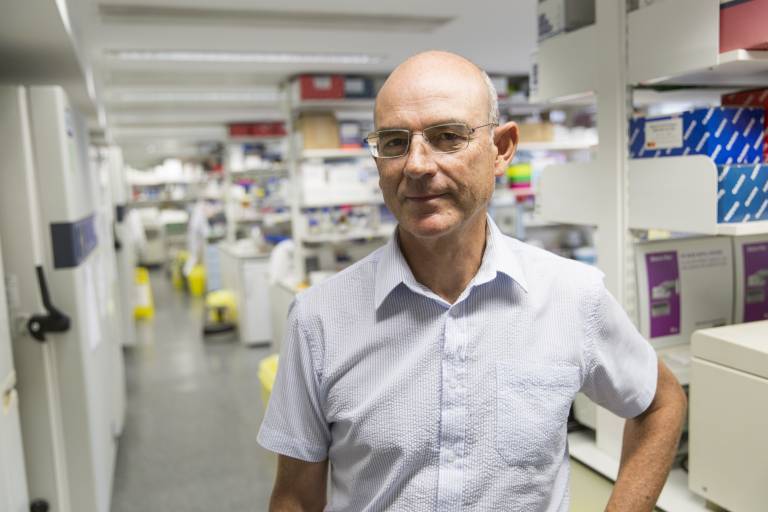Children with neuromuscular diseases given new lease of life
Clinical research at UCL is helping transform the lives of thousands of children with neuromuscular diseases, allowing them to live active lives for longer.

28 April 2022
Duchenne Muscular Dystrophy (DMD) affects 1 in 3,500 young males who, due to mutations in a gene called the dystrophin gene, develop progressive muscle weakness leading to loss of walking abilities, heart problems and respiratory failure.
Spinal Muscular Atrophy affects 1 in 6,000-10,000 babies and young children. It is a motorneuron disease arising from mutations in the survival motorneuron gene (SMN) and in its most common and severe form is fatal within a year. These diseases affect some two million children worldwide.
Restoring correct gene function
Professor Francesco Muntoni, a paediatric neurologist at the UCL Great Ormond Street Institute of Child Health (GOS ICH) coordinated a national consortium on muscular dystrophy experimental therapy (UK MDEX) to find out if the DMD gene could be modified to restore protein production in children with DMD.
The team devised an innovative approach to restore production of these vital proteins. They used short sequences of genetic material called antisense oligo-nucleotides (ASOs) to correct gene function and allow the patients’ cells to produce the vital protein.
The approach showed promise and Professor Muntoni led successful Phase 1 and Phase 2 clinical studies to confirm the effectiveness of ASOs in boys with DMD carrying different types of genetic defects.
A world first for DMD
The US company Sarepta acquired the technology and performed large clinical trials which led to FDA approval of the first ever medicine for DMD in 2016.
The medicine – eteplirsen (Exondys 51) – is effective in 13% DMD cases and has already been used to delay the onset of disability in 1500 DMD patients in the US. A second ASO based medicine for DMD – Vyondis 53– that can be used to treat a further 8% of DMA patients (18,000 boys worldwide) was given regulatory approval in December 2019.
Together these medicines are transforming the lives of thousands of affected children, allowing them to live active lives for longer; maintaining the ability to walk and avoiding respiratory failure.
Working with industry and the NHS
With expertise in a range of neuromuscular diseases, Professor Muntoni’s team also developed a new ASO which could restore protein production to correct the lack of the survival motor neuron protein (SMN) in the brain and nervous system which causes Spinal Muscular Atrophy (SMA).
Soon afterwards, the ASO-based medicine nusinersen (Spinraza®) was developed by the pharmaceutical company Biogen and has been used to treat 2600 babies in the US to date. In June 2019, Spinraza was adopted for use by the NHS. More than 11,000 patients are using this drug in the EU, UK and US.
Since then, the UCL team and others have worked tirelessly to ensure patients with SMA across the UK get access to Spinraza, alongside the best possible medical care. To ensure high quality care and efficiency Muntoni obtained funding to establish the SMA REACH UK, a UK wide consortium of healthcare professionals involved the delivery of care, and now also of novel therapies for patients with SMA.
Professor Muntoni commented: “The UCL team has facilitated Spinraza implementation in the UK and since its NHS adoption in June 2019, 300 patients have already gained access. These medicines are changing the clinical outcomes for patients and have together generated sales of more than US$5.5 billion.”
Research synopsis
Developing the first treatments for Duchenne Muscular Dystrophy and Spinal Muscular Atrophy
Research from UCL is transforming the treatment of life-limiting neuromuscular diseases that affect over two million children. The ground-breaking work at UCL resulted in industry-led clinical trials and regulatory approval for effective treatments for Duchenne Muscular Dystrophy (DMD) and Spinal Muscular Atrophy (SMA) which are now benefiting children worldwide.
Links
- Professor Francesco Muntoni’s academic profile
- UCL Great Ormond Street Institute of Child Health
- UCL Faculty of Population Health Sciences
- UCL Population Health Sciences REF 2021
 Close
Close

